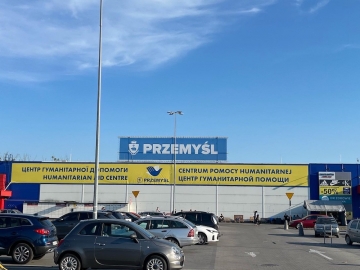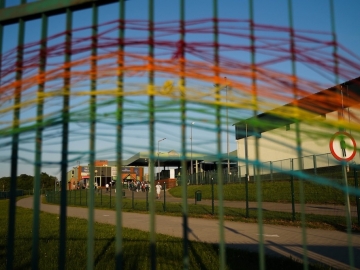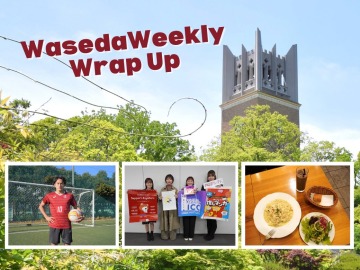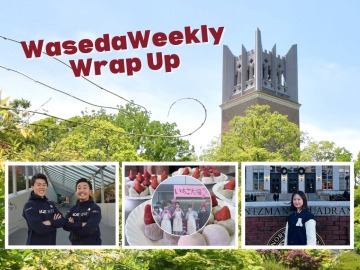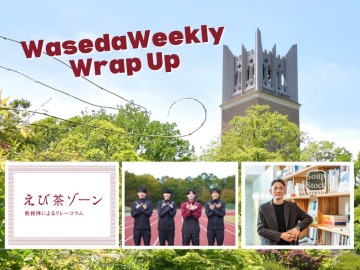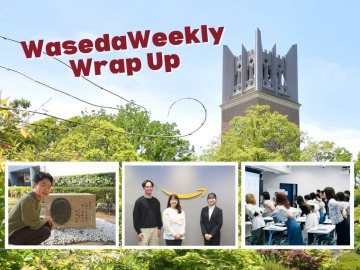“I want to show that even if I have a disability, I can go abroad and support someone.”
Rinka Saito, 2nd year in the School of Social Sciences
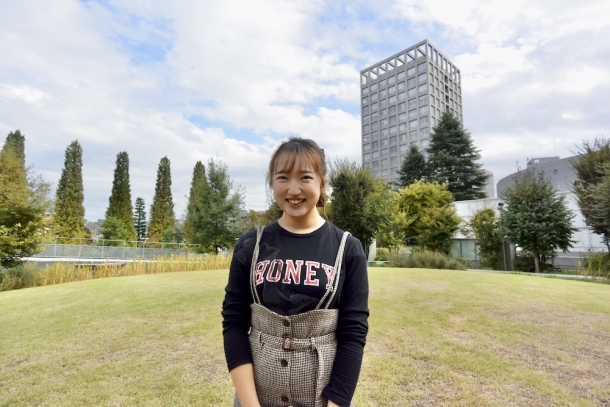
Toyama Campus at Toyama Hill
From May to June 2022, Rinka Saito, a 2nd-year student in the School of Social Sciences, was involved in support activities for Ukrainian refugees in Poland. Saito-san, who has sensorineural hearing loss, said that she immediately applied upon learning about the call for participants in a project to support evacuees, emphasizing minority support, which she herself is interested in. We asked Saito-san, who says that her experience at the shelter in Poland changed her, about her experiences with the support activities, her studies at Waseda, and her outlook for the future.
――As the war keeps raging in Ukraine, I think it must have taken big determination to decide to provide assistance in Ukraine’s neighbor Poland. How did you get involved in the support activities?
For about two weeks from May 2022, I participated in support activities for Ukrainian refugees in Poland as a member of “The Volunteer Program for Ukraine,” a volunteer activity organized by the Japan Foundation Volunteer Center to support displaced people from Ukraine. I decided to participate because when this support project was featured in the news, they said that they were looking for “university students to support displaced people with disabilities.”
I was born with a severe disability called sensorineural hearing loss (hearing loss due to damage to the inner ear and central nervous system). I had surgery to put a cochlear implant when I was one year old, and I continued to train so that I can hear and speak now, but I have always felt that I am in a minority. That’s why when I heard about “support for minority refugees,” I thought that there must be things that only I can understand, and I felt I had no choice but to go. I had no hesitation when applying.
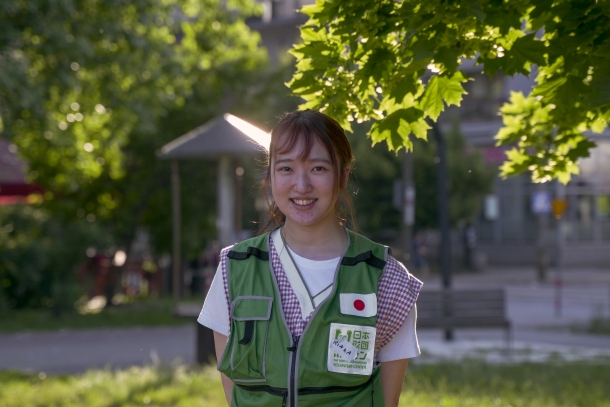
(Photo courtesy of Japan Foundation Volunteer Center)
――What kind of experiences did you have when actually doing the support activities?
I provided assistance in Przemysl, a city in southeastern Poland, and Medyka, a town on the border with Ukraine, further east. Medyka is a quiet town where you can hear birds singing, and I couldn’t even believe that the war was going on so close by.
Left: The former site of a large supermarket in Przemysl that was used as a temporary shelter.
Right: Medyka’s immigration facility. There was a line of people returning to Ukraine.
At a temporary shelter in Przemysl, where I was doing my support activities, there were many refugees, ranging from those who stayed only for two or three days while waiting for a visa to those who stayed for two or three months because they had nowhere to go. Some said they had fled for their lives in only shorts and flip-flops. At the shelter, I engaged in various activities, from sorting relief supplies from all over the world to caring for children as well as disinfecting and measuring temperatures to stave off infectious diseases. In volunteering at the evacuation shelter, it was important not to do only after being told but to find a role on your own.
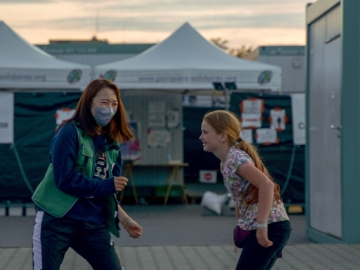
Saito-san playing with displaced children (Photo courtesy of Japan Foundation Volunteer Center)
――Please tell us what left an impression on you while working at the shelter.
Volunteers from all over the world gathered at the shelter. Us Japanese were the only who had been dispatched as students, and some had been kindergarten teachers in their own countries and couldn’t stay put when they saw the children suffering and came as volunteers. What was particularly impressive was the hard work of the Russian volunteers. I was impressed how they were working for the refugees without regard for the risk of being charged with crimes by the Russian government. Furthermore, I was moved by the fact that there were people volunteering at shelters while displaced themselves.

Mealtime at the temporary shelter. She was eating the same food as the refugees.
I also met a university student in the same year who had been evacuated from Ukraine. His dad had gone to war and his mom had lost her leg in the war. In Ukraine, a man aged 18–60 can’t leave the country due to the national mobilization decree, but he was allowed to leave to care for his mother and came to the shelter. However, he had to quit the university he had originally attended to devote himself to this nursing care, saying, “I couldn’t study because of the war.” When he showed me his smartphone, right after the photos of a university festival, there were graphic photos of the war and recordings of air raid warning alerts. Because he was the same age as me and a university student majoring in the same field as me, it was a big shock, and I remember that in particular.
I supported the mother of that university student, but contrary to my initial expectations, I didn’t have many opportunities to interact with people with disabilities as part of the support activities. However, I felt that fleeing to another country as an evacuee and stepping outside the social safety net that you had built up until then had things in common with a disability.
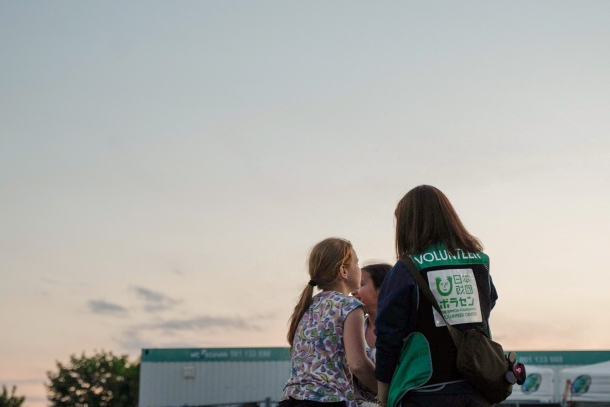
One of the important roles of volunteers was to hear from evacuees about their experiences of the war. She said she felt frustrated because she had not experienced the war and could only listen to their stories (Photo courtesy of Japan Foundation Volunteer Center)
――What kind of experience was the overseas support activities for you?
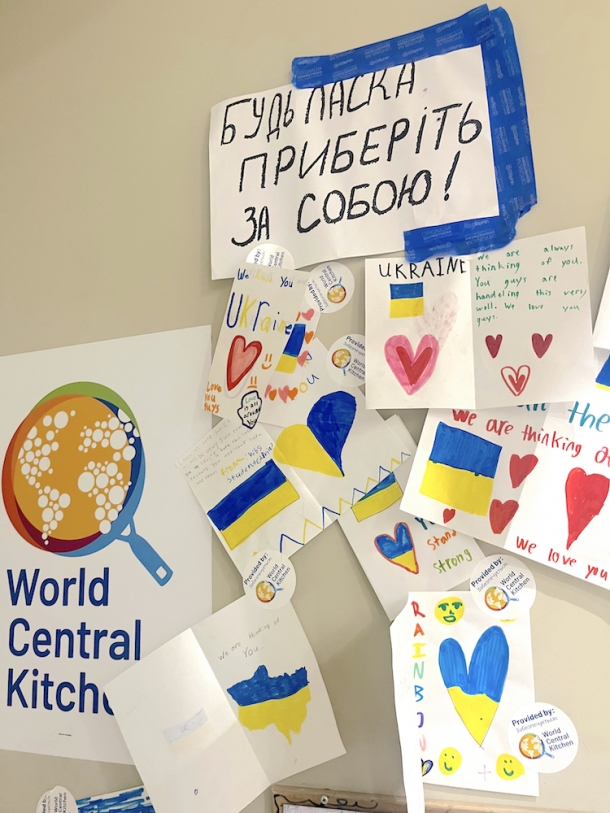
Letters of support from all over the world on the walls of the shelter.
Before I went to Poland, I had a strong desire to do what I wanted to do with all my ability. I wanted to experience and try out various things through volunteer activities. However, in the course of actually conducting support activities, I began to think not only about what I wanted to do but also about what was required of me.
I also feel that my interests have expanded. Until now, I have wanted to work for the social participation of the hearing impaired, but supporting Ukrainian refugees has broadened my interest in the social participation of minorities as a whole.
Even after returning to Japan, I have been involved in support activities for people who have been evacuated from Ukraine to Japan. Currently, I am participating in activities to support five Ukrainian students accepted to Waseda University. Together with other Waseda university students, I help international students when they have problems in their daily lives and organize exchange events so that they can get used to the university and enjoy their stay in Tokyo. When doing this, I am conscious about treating them as “university students like me.” The Ukrainian students say they want to integrate into the university as students, not as refugees to be helped. I want to respect that feeling.
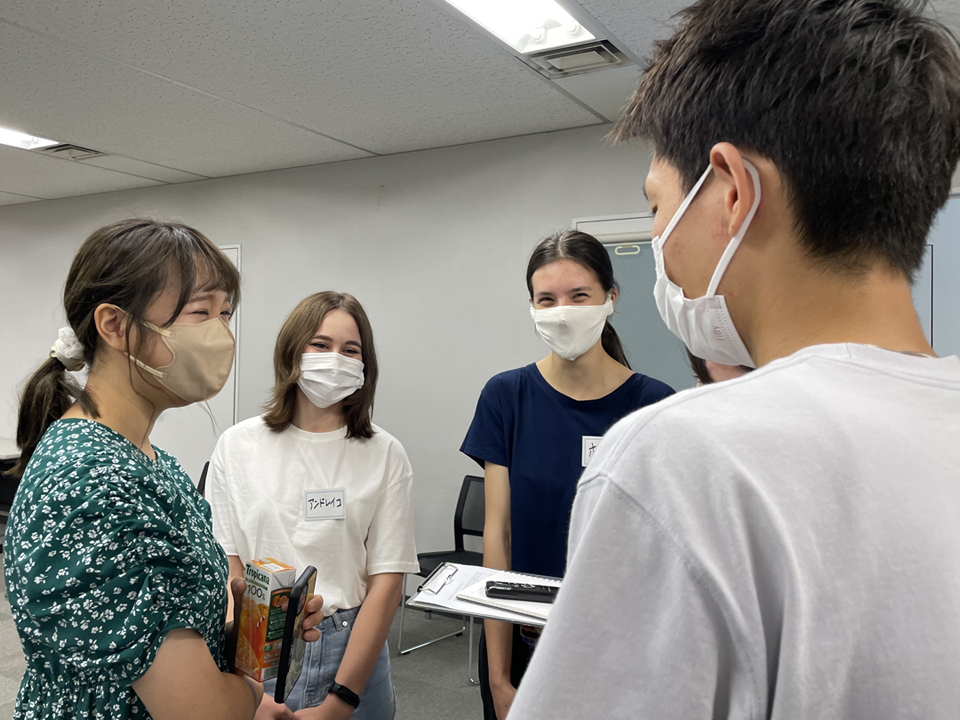
A photo taken at the welcome party for Ukrainian students held at the Waseda campus in September 2022.
――Please tell us about your future outlook.
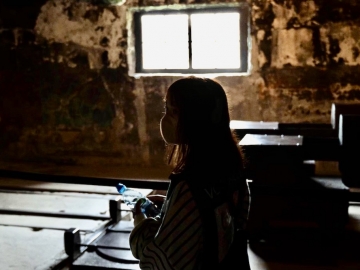
In Poland, she also visited the Auschwitz concentration camp.
Since this fall, I have been a member of the seminar on international relations of Associate Professor Hajime Okusako (School of Social Sciences), where I am learning about international conflicts while conducting mutual verification of theory and history. Through this study, I want to think about how we can promote the participation of minorities in society at an international level.
Recently, I was selected as a first-round member of the Murakami Foundation Public Leaders Academy. This is an initiative that aims to foster female public leaders, solve social problems, and close the gender gap. I don’t know yet if I will pursue a career in politics, but I am aware of the problem that there are few women and people with disabilities among politicians, and I am also interested in changing society through politics.
People with hearing impairments often isolate themselves from others. I want to show that even if I have a disability, I can go abroad and support someone. After entering university, I realized that I can do something for society, and now I am able to devote myself to exciting learning in the seminars. I will continue to study and work with the aim of encouraging and being a role model for others.
The 832nd
Interview, text, photography: Waseda Weekly reporters (SJC Student Staff)
Masaki Ueda, 1st year in the Master’s Program of the Graduate School of Law
[Profile]
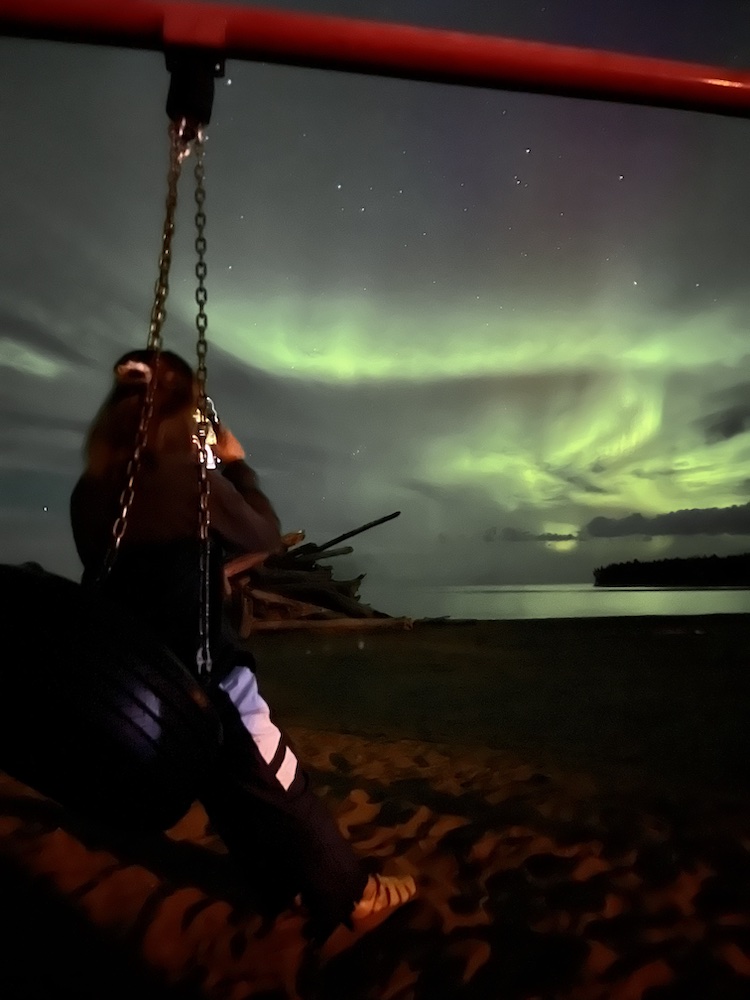 Saito-san was born in Aichi Prefecture. She graduated from Ouka Gakuen High School. From her 2nd year of high school, she studied abroad at a high school in the United States for one and a half years. She says that she chose Waseda University because of the influence of her alumni family members, saying that “Azure Sky” (Konpeki-no-sora) was sung as a lullaby to her. Since her first year of university, she has participated in several seminars at The University of Tokyo and Keio University, where she studied social participation and social policies for people with disabilities and foreigners. This photo was taken when she traveled to North America with her seminar seniors. She really enjoyed the northern lights.
Saito-san was born in Aichi Prefecture. She graduated from Ouka Gakuen High School. From her 2nd year of high school, she studied abroad at a high school in the United States for one and a half years. She says that she chose Waseda University because of the influence of her alumni family members, saying that “Azure Sky” (Konpeki-no-sora) was sung as a lullaby to her. Since her first year of university, she has participated in several seminars at The University of Tokyo and Keio University, where she studied social participation and social policies for people with disabilities and foreigners. This photo was taken when she traveled to North America with her seminar seniors. She really enjoyed the northern lights.
*This article is a translation from the Japanese edition of Waseda Weekly published on November 29, 2022. The content is current at the time of Japanese publication.

